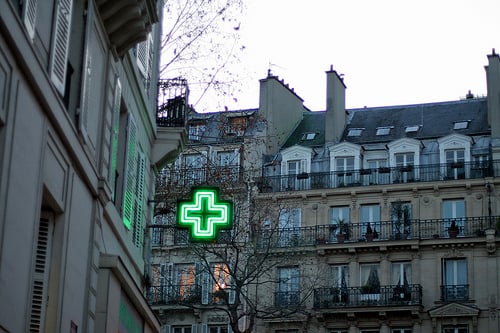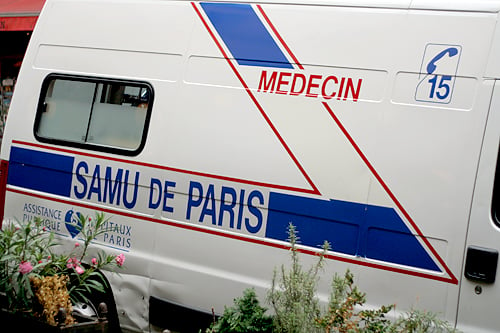Health Care Tips for Travelers to France

I recently spoke at Bloom Where You’re Planted, a program intended to introduce newcomers to the sometimes perplexing differences of life abroad. I stayed after my talk for a seminar on French health care. While I was familiar with some of the information, some of you might not be, especially those who are traveling to Paris.
This post includes numbers to call and places to go if you need medical attention. Of course, nothing here is meant to be construed as medical advice and you should always speak to your personal health care provider, who can advise you on the most appropriate actions in the event of an emergency or if you have a health-related question.
France has excellent health care and it is open to all. Care is not rationed out and you are guaranteed care regardless of your ability to pay or pre-existing condition.
If you have to have medical care and don’t speak French, ask the provider who is treating you if they speak English. Many doctors and pharmacists do, although mostly in larger cities.
Be sure to check with your provider at home before your trip to ascertain coverage abroad. If necessary, consider purchasing travelers health insurance as primary or secondary coverage. Note that most travel insurance covers incidents like trip cancellation and lost luggage, not necessarily health care costs.
Write down vital information and keep it in your wallet during your trip. That should include your name, address, address where you’re staying during your trip, emergency contacts, and any important medical conditions or prescription drugs that you’re taking that health care providers might need to be aware of if treating you.
All the numbers listed will work from any phone in France. If using a pay phone, you don’t need a phone card to dial them. If you can’t find a functioning pay phone, go into a pharmacy and they’ll call emergency services for you.
Lastly, French medical care providers don’t provide a lot in the way of bedside manner. There’s not a lot of hand-holding so don’t be too concerned if the health care provider isn’t showing a lot of compassion. It can be off-putting for those who aren’t used to it, but it’s a different health care model. Patients are expected to be pro-active, so don’t be shy about asking questions and getting detailed explanation, if necessary.

SOS Médecins
If you are traveling and have a medical issue, you can call SOS Médecins. They will come to your hotel or apartment 24 hours a day and their vehicles are equipped with what they call “sophisticated medical material”. This is not emergency services but they will treat you for many other ailments.
To reach them, day or night, call 3624. You will need to tell them which départment you are in. Paris is 75.
SOS Médicins is composed of doctors who are on-call, and the price is around €50-70 for the visit. You will have to pay in cash or by check (in euros) at the time of the visit. The doctors are French but when you call, you can ask if they have an English-speaking doctor. It’s not guaranteed, but many French doctors do speak varying degrees of English.
Pharmacies
There are thousands of pharmacies in Paris and their staff is trained to attend to a variety of minor medical needs. In France, pharmacists can can also evaluate your situation, treat some illnesses, and make the appropriate calls (such as calling an ambulance). And you’ll get a better response if you show up in a medical care if they call for you rather than if you just showed up.
If the pharmacy is closed, they usually list on the door another pharmacy in the neighborhood that’s open.
Emergency Numbers
SAMU provides ambulances and emergency medical care. That number is 15.
If you have an emergency or need other medical assistance, you can also call 18, which is the fire department. (Les pompiers). They are trained to treat a variety of emergencies and can coordinate medical care and ambulance service.
There is also an EU-wide emergency service number, which can be reached by dialing 112 from anywhere in Europe. Because it is an international organization, you will almost certainly reach someone who speaks English.
Hospitals
If you have to go to the hospital, the ambulance will take you to the closest facility, or to one that specializes in what ails you. The centrally-located Hotel Dieu, located adjacent to Notre Dame, is well-regarded.
Contrary to widespread belief, health care is not free in France and you will be presented with a bill at the end of your treatment, which you’ll be expected to pay before you leave. (French residents get reimbursed by the system for a variable percentage of the fees.) If you come from the United States, the payment will likely be much less than you’d pay back in the states. If you are not in the French system, they should give you a feuille de soin, a amber-colored receipt noting the treatment, the attending physician, and the charges.
On the far western edge of Paris, in Neuilly, is The American Hospital, which is a private facility and you will need to pay for the services at the time of treatment. They advertise bi-lingual staff, but in my one experience there, not all personnel speak English. They also have a dental clinic as well.
If you are paying out-of-pocket, your bill will likely be quite a bit higher here than in a French public hospital. However they do understand American-style health insurance procedures and reimbursements, and you may feel more comfortable here.
Related Links
Protection Civile Paris (List of French emergency services, in French)
SOS 112 Europe (EU-wide emergency service number)
SOS Help (English-speaking listening & counseling line)
Squaremouth (Travel & health insurance comparison site)
World Nomads (Travel & health insurance)
French Emergency Terms (About.com)
Note: None of these are affiliate links and I have no relation to any of the insurance or health care websites listed. They are listed for informational purposes only.















